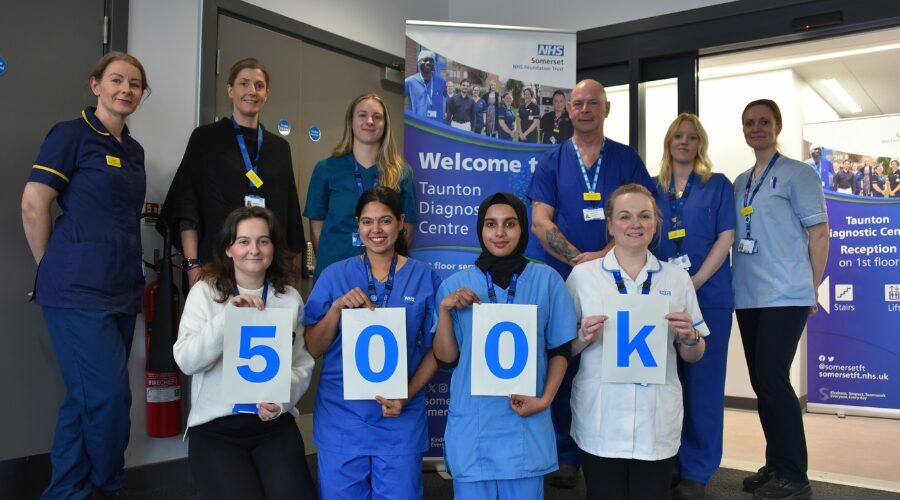
Spotlight
Somerset marks half a million patient tests through community diagnostic centres
It’s a huge milestone this month as the 500,000th patient test took place at one of Somerset’s community diagnostic centres.
The national community diagnostic centre programme began in August 2021 with the aim of reforming diagnostic pathways, offering patients a wide range of diagnostic tests closer to home, and a greater choice on where and how they are undertaken, reducing the need for hospital visits, and often leading to faster access to treatment.
The programme was launched on the back of an independent review of diagnostic services in England, undertaken by Sir Mike Richards CBE, at the turn of the decade.
Somerset’s community diagnostic centre programme offers 21 different diagnostic tests across a number of sites throughout the county, and is run in a collaboration between our trust, GP practices, and organisations from the independent sector.
The programme has created flagship diagnostic centres, including the Taunton Diagnostic Centre, which was opened by Sir Mike Richards CBE in September 2021 and was the first independent sector partnership of its kind in the UK, and has since been replicated nationally.
The programme has also developed and launched specialist ophthalmology diagnostic facilities, which are the blueprint for how these type of centres would be provided across England.
An innovative partnership with Somerset’s GP practices has been developed to provide a range of tests in the county’s community diagnostic centres, which shows the Somerset Integrated Care System’s commitment to investing in all partners within the health system, as well as using the experience, clinical skills and local knowledge they bring.
We are now planning to open the largest community diagnostic centre, in Yeovil in March 2025, which will further expand diagnostic capacity in the east of Somerset, and will provide the facilities to develop new ways of diagnosing and caring for patients.
David Craig, programme director for Somerset’s community diagnostic centres, says he’s pleased that the programme in Somerset has reached such an important milestone.
“For our colleagues to provide half a million diagnostic tests in such a short space of time is a real testament to the incredible effort and skill of everyone involved in our community diagnostic centres in Somerset,” he says.
“The development of the community diagnostic programme has been achieved by forming partnerships across the health and care system, including the independent sector and local charities.
“When the programme first began in 2021, our diagnostic services were in a strong position nationally, thanks to the committed and highly qualified diagnostic teams already in place.
“But the additional investment by NHS England in community diagnostic centres since then has allowed us to grow our diagnostic capabilities from strength-to-strength, which has been particularly crucial as we recover our waiting times from the COVID-19 pandemic and meet the additional demand of up to 7% every year.
“In fact, we’ve seen a 17.5% improvement in diagnostic waiting times since the programme began. Feedback has been great too with 98% of patients who’ve been through our community diagnostic centres have said they’re either satisfied or very satisfied with their care.
“Alongside the new facilities, funding has been secured to invest in almost 90 pieces of new or replacement diagnostic equipment to improve the range and quality of services that our colleagues are able to provide.
“The new facilities, equipment and partners have enabled us to expand nine different specialties: cardiology, radiology, ophthalmology, respiratory, phlebotomy, audiology, dermatology, neurology, and endoscopy.”
Following the investment into the community diagnostic programme, almost 60 new clinical and administrative roles have been created in Somerset.
David continues: “The next stage of the Somerset diagnostic programme is to transform our additional diagnostic capacity and excellent facilities, so patients can get everything they need at a single appointment. This is very much in line with the government’s plans for reforming planned care in the NHS.”
